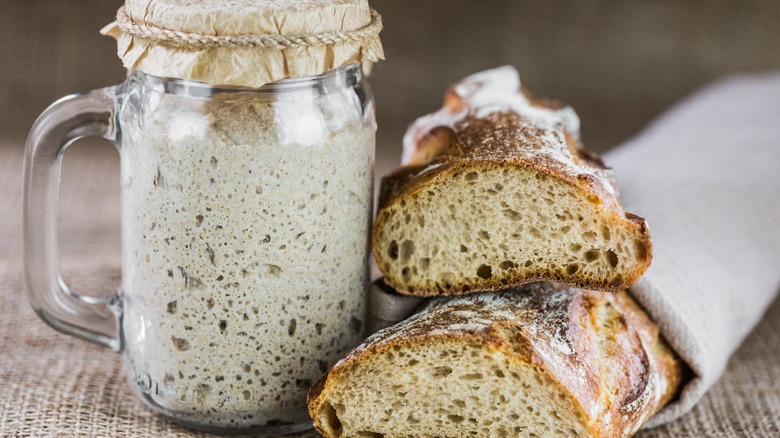The Health Benefits Of Eating More Sourdough Bread
If you followed food trends during the pandemic, then you may have come across sourdough bread. You may have even made your own loaf from scratch — just about anyone can do it. According to NPR, all you need to create a sourdough bread starter is flour, water, and sugar. Incredibly, as the mixture sits at room temperature, air brings yeast into the mixture. You'll know the starter is ready when it starts to smell sour. If you continue to add the same portions of water and flour to the mix after you use it (and store it in a cold place), sourdough starters can last for years.
Possibly more interesting than the process of making sourdough starters in the history of the bread. Sourdough was first made in Egypt before it eventually spread to Greece (via The Sourdough School). While sourdough was on the rise, eventually making its way to Rome, commercial yeasts disrupted sourdough's popularity in the 19th century. But sourdough bread would make a comeback when locals discovered that San Francisco's climate — the fog that's commonly referred to as "Karl" — provides optimal conditions to produce sourdough bread, reports National Geographic. In fact, sourdough bread is so quintessentially San Franciscan that the bacteria that contributes to its unique taste is called Lactobacillus sanfranciscensis. Taste aside, you might wonder if sourdough has any health benefits. The answer may surprise you.
Is eating sourdough bread healthy?
Eating sourdough bread has many health benefits, believe it or not. For starters, sourdough bread may be easier to digest than other breads, particularly for those with digestive problems like irritable bowel syndrome, or IBS (per Medical News Today). Sourdough bread may lessen certain types of fermentable sugars that can cause intestinal issues. WebMD says that sourdough bread has other health benefits. For example, sourdough bread contains higher amounts of antioxidants than other breads. Antioxidants have protective properties that can prevent the cellular damage associated with some diseases. Compared to white bread, sourdough has a lower glycemic index, making it the healthier choice for those that need to monitor their blood sugar levels.
Sourdough bread also has some nutritional advantages over other breads, reports Healthline. Sourdough's lactic acid bacteria helps to lower the pH of the bread, which in turn limits the amount of phytate — an acid that can prevent the body from optimally absorbing minerals found in whole grain breads like magnesium, potassium, and zinc.


